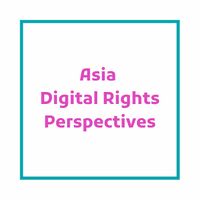Asia Digital Rights Perspectives: Difference between revisions
| Line 26: | Line 26: | ||
'''Presentation''' | '''Presentation''' | ||
[https://cryptpad.fr/file/#/2/file/YrfpnHovIAydc27CKRKqRgYD/ Asia Digital Rights Perspectives Presentation] | |||
'''Resources''' | '''Resources''' | ||
Revision as of 13:10, 21 June 2023

- Who: Astha Rajvanshi
- Date: Thursday, June 8
- Time: 9am EDT / 1pm UTC (What time is it in my city?)
- Language: English
- Location: Zoom
RSVP: https://digitalrights.formstack.com/forms/perspectivesfromthesouth
Asia Digital Rights perspectives with Astha Rajvanshi
In this session we will talk about digital rights in Asia, its perspectives and cases during 2022-2023. The main topics will be:
- Key issues and emerging trends in Asia for digital human rights: how privacy data bills, internet shutdowns and VPN access impact people on the ground.
- The challenges of bringing disparate digital communities across Asia together.
- Lessons learned from past successes and failures of digital networks, campaigns and infrastructure.
Speaker:
Astha Rajvanshi is our Asia Community Lead at Team CommUNITY. She is a journalist covering international news for TIME, with a special focus on India. She is interested in exploring how technology and surveillance impacts the intersection of human rights and gender.
Notes & Resources
Presentation & Resources
Presentation
Asia Digital Rights Perspectives Presentation
Resources
- https://totem-project.org/
- https://tacticaltech.org/projects/Digital-Enquirer-Kit/
- https://digitalfirstaid.org/en/index.html
- Languages Left Behind: Automated Content Analysis in Non-English Languages
Q&A Section
Please can you talk a little more about this intersection of citizen science and activism as you see it - regarding some of the citizen-led tools you mention?
These tools let you know information about your data rights in general. We often think about activists but the data collected is from ordinary citizens. The wrong thing in the Internet helps building conflicts between regions and these tools help you recognize that. If you are targeted or you are surveilled.
We know these authoritarian regimes are good at learning from each other. Do you know of any examples of civic groups in different countries learning from each other to resist threats on these issues?
Milk-tea Alliance is a great example. It was created in Myanmar in 2021 and the term was spread in the Internet when Hong Kong was trying to protected itself from China. Several countries started to use this hashtag to rise awareness of what was going on in Taiwan. This movement made the digital rights defenders across Asia to discuss what to do all together, on the street, with digital tools too. The cool thing is that it had not leaders. Just online collaborative work by activists and citizens across countries.
The TCU VPN Initiative is a great example too from another perspective.
These toolkits are super cool and helpful but unfortunately because they are mostly in English or other regionally dominant languages they don’t reach the people that need it most. Do you know of any initiatives that work to get these translated/adapted to different contexts?
Center for Technology & Democracy is studying this and Localization Lab is a great example for this.
I would like to know what reason the governments give to reduce the right to use VPNs in the region. How do the governments present this to the users?
They use the "regulation of the internet" framework. The narrative is about protecting the citizens but it includes the use of VPN, the data that government collects, etc.
How do you see the future of the region?
We are seeing the challenge or opportunity of the raise of AI. A lot of countries are truing to figure out how to regulate it and how to use it in a good way. It is introducing a digital apartheid, like in a lot of poor asian countries.
Governments have become incredible authoritarian with internet and digital spaces and information and it will not go away.
We have a lot of elections next year so it will be interesting to see what govs do with cybersecurity laws and citizens digital rights.
One of the challenges is that in a place like India, we talk about data or privacy as an important thing but those are topic that aren't familiar to the majority: there's a lack of meaning in our same language and cultures. There is no an understanding so there isn't a real sense of need of protection of these rights.
Do you see commonalities within regions after working on the regional monthly briefs?
We share commonalities with Mardiya, like with the Digital IDs, how govs use biometrics for surveilling citizens and collecting data. The rights of workers and how laws are implemented in different countries. Like Urusula with LATAM.